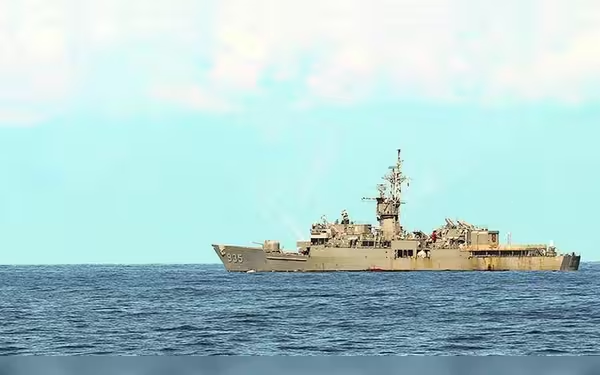Saturday, November 16, 2024 09:27 PM
China Criticizes German Naval Passage Through Taiwan Strait
- China warns German ships increase security risks.
- First German naval presence in Taiwan Strait in 20 years.
- Tensions rise over international navigation rights.
 Image Credits: thefrontierpost
Image Credits: thefrontierpostChina condemns German naval ships in Taiwan Strait, citing increased security risks and asserting its sovereignty.
In recent developments, tensions in the Taiwan Strait have escalated following the passage of two German naval vessels through these contentious waters. This incident has drawn sharp criticism from China, which perceives such actions as a direct threat to its sovereignty. The Taiwan Strait, a crucial maritime route, separates Taiwan from mainland China and has long been a focal point of geopolitical disputes.
On Saturday, a spokesperson for the Chinese military, Li Xi, expressed strong disapproval of Germany's actions, stating, "The German side’s behavior increases security risks and sends incorrect signals." This statement underscores China's sensitivity regarding foreign military presence in the region, particularly from nations that it views as adversaries. Li further emphasized that the People’s Liberation Army is prepared to "resolutely counter all threats and provocations," indicating a readiness to respond to perceived challenges.
The German Defense Minister, Boris Pistorius, confirmed that the frigate Baden-Wuerttemberg and the supply ship Frankfurt am Main had indeed sailed through the Taiwan Strait. This marked a significant moment, as it was the first time in over twenty years that German naval forces had navigated these waters. While the United States and other countries frequently conduct similar operations, Germany's involvement has raised eyebrows and heightened tensions.
China's stance on Taiwan is clear; it considers the island a breakaway province and asserts its claim over the surrounding waters. In contrast, Germany, along with several other nations, argues that such naval passages are a matter of international law and freedom of navigation. This divergence in perspectives highlights the complexities of international relations in the region.
As the situation unfolds, it is essential to recognize the broader implications of these naval movements. The Taiwan Strait is not just a body of water; it is a symbol of the ongoing struggle for power and influence in East Asia. The actions of countries like Germany and the responses from China will likely shape the future of maritime security and diplomatic relations in the region.
The recent passage of German naval ships through the Taiwan Strait serves as a reminder of the delicate balance of power in international waters. As nations navigate their interests and assert their rights, the potential for conflict remains ever-present. It is crucial for all parties involved to engage in dialogue and seek peaceful resolutions to avoid escalating tensions further.













